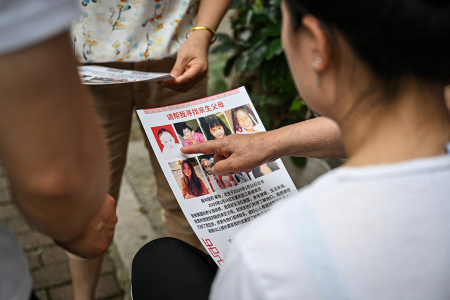Orphan ministry leader hopes Christians in China will step up as country stops int’l adoptions

China has announced that it will no longer allow children to be sent overseas for adoption, ending a practice that has been in place for over three decades. The policy change stems from the country’s former strict one-child policy, which led to the international adoption of thousands of children, primarily girls and children with disabilities.
The head of a Christian orphan network expressed concern regarding the fate of these unwanted children, but said he has hope that believers in China will step up and care for the most vulnerable.
Commenting to Christian Daily International about the sudden change, Jedd Medefind, president of Christian Alliance for Orphans (CAFO), said “China has been steadily constricting international adoption for many years. Most observers expected that to continue, but this sudden shutdown still came as a surprise to many.”
“It's especially heartbreaking for the families who've already been matched with children, some for many years. They don't consider these children statistics or photographs, but as their daughters and sons,” he said.
Since China first opened its doors to international adoption in 1992, more than 160,000 Chinese children have found homes with families around the world. Of these, approximately 82,000 were adopted by families in the United States, according to data from China's Children International (CCI).
On Thursday, Foreign Ministry Spokeswoman Mao Ning confirmed the policy shift, explaining that the decision aligns with global trends in adoption practices. She noted that the only exceptions to the new rule would be cases involving the adoption of a child or stepchild by foreign relatives within three generations.
"Apart from the adoption of a child or stepchild of blood relatives of the same generation who are within three generations of foreigners coming to China to adopt, China will not send children abroad for adoption," Mao said. She expressed gratitude toward foreign families and governments that have adopted Chinese children, acknowledging the love and kindness they’ve shown over the years.
It remains unclear how the policy shift will affect families in the process of adopting Chinese children, leaving many prospective adoptive parents in limbo.
The decision comes amid broader demographic challenges faced by China. After two consecutive years of population decline, the country is struggling to encourage young couples to marry and have children. Despite incentives, many young women are hesitant to start families, citing concerns over the high cost of childcare, job security, and an uncertain economic future.
China’s one-child policy, which was in place from 1979 to 2015, played a significant role in shaping the country's adoption landscape. Under the policy, many families chose to keep boys, traditionally seen as the main family caregivers, and gave up girls for adoption. This led to a surge in international adoptions, particularly to Western countries.
As China seeks to address its population decline and shift its focus toward domestic adoption and family planning, the end of international adoptions marks a significant turning point in the country’s social policy.
Medefind is not convinced that the change will lead to more Chinese families adopting these children, however. “Virtually all children adopted from China in recent years were at least 4 or 5 years old or older and also had some kind of disability,” he says. Therefore, he is concerned that “these children simply won't have a way to ever reach a permanent family — not overseas, and almost certainly not domestically either.”
China’s move to halt international adoptions mirrors recent actions by other nations. In May, the Netherlands banned its citizens from adopting children from foreign countries, while Denmark has also stopped international adoptions after its last adoption agency ceased operations.
“It's impossible to know what will happen to each of the Chinese children who'll now be kept from joining a family via intercountry adoption, but from all we've seen in countries that have taken similar steps to curtail international adoption, the prognosis isn't good,” Medefind says. “Large numbers of kids simply grow up without families, in institutions or worse.”
He observed that countries that banned intercountry adoption sometimes see a modest initial uptick in domestic adoptions of healthy infants, but many other children simply languish.
“It's likely most of the children who would have been adopted internationally — the majority of which have special needs — will never find a family. They will grow up facing the profound struggles that come with orphanhood and disabilities in a culture that looks down on both.”
Medefind, however, also sees the new situation as an opportunity for Christians in China to distinguish themselves from the wider culture and reveal Christ’s love to the most vulnerable.
“My earnest hope is that many caring Chinese families, especially the growing number of devout Christians in China, will consider adopting an older child, a sibling group, or a child with special needs. That'd be an incredibly counter-cultural choice in a society that prizes bloodlines and views both orphanhood and disability as permanent defects,” he says.
“Committed Christians around the world — motivated by the love of God and their own sense of being adopted into His family — are increasingly making choices like that, and I have a great deal of respect for and hope in Chinese believers for this also.”
Originally published at Christian Daily International
Christian Daily International provides biblical, factual and personal news, stories and perspectives from every region, focusing on religious freedom, holistic mission and other issues relevant for the global Church today.





















